Mulching for a Drought-resistant Garden
Temperatures are breaking new records and rains are much needed. In times like these our gardens tend to suffer as well, particularly if we can’t afford to use up all our precious water on them. But there are a number of simple ways to make the garden more tolerant to droughts. The easiest and most effective technique is mulching.
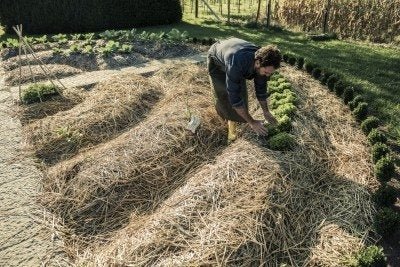
Keeping the Water from Evaporating
Mulch can be considered anything that you use to cover the ground with, whether it’s woodchips, cardboard, compost, straw, weeds, wooden boards, leaves, even rocks, or a combination thereof. While each type of mulch comes with its own set of pros and cons, one thing they all do, is give the water in the soil another barrier before it evaporates into the air. That is the first and foremost function of mulching the ground. And the effect can be felt immediately: just stick your finger into the ground that’s been covered by a rock: it is going to feel a bit damp, compared to uncovered soil. And this is just the first one of a wide range of benefits.
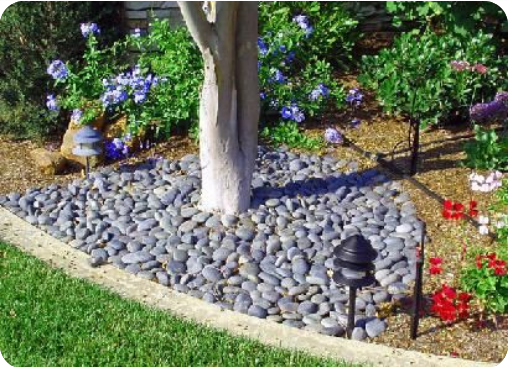
The Sponge Effect
While rocks are great at shading the ground, and trapping moisture in the slightly cooler air between them, they don’t actually soak up the water. Organic material, on the other hand, that is anything from straw and leaves to cardboard, can serve as a veritable sponge, keeping the water inside and among its pieces. Though it can still evaporate from there, it happens at a much slower rate than out of the naked ground. During cooler nights and the early morning hours, it can even soak down into the soil, at a rate it can absorb it without being overwhelmed. However, the best thing about organic mulch is that while it decomposes it mixes into the soil, making itself like a sponge for optimal water retention.
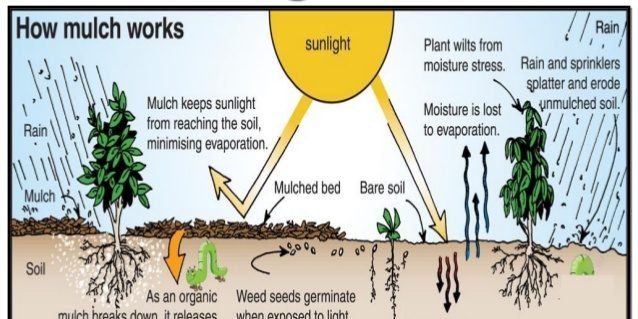
A Place to Live a Rich Life
Talking about decomposing, I can’t get around mentioning the incredible diversity of microbes that make up a healthy soil. As you would expect, if you create a moist and protected environment for them, they are going to come from far and near to help decompose your organic mulch, mix it into the ground, and create a rich soil ecosystem. Best of all, you don’t need to do a thing after you’ve established a nice mulched garden bed. Though if you water it on occasion, you will see it thrive even more.
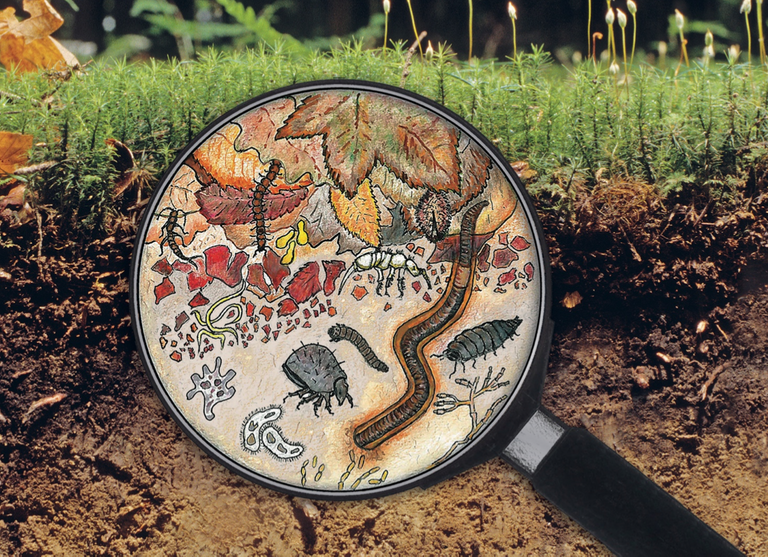
Nutrients Anyone?
If you really want to do everything you can to create a rich soil life, add something nutritious to your soil: some ripe compost, or cow manure. Don’t leave these nitrogen rich materials exposed to the sun either, but make sure it is covered with other layers, such as straw or leaves. This is where a combination of different types of mulch comes in handy, which mulch enthusiasts refer to as “sheet mulching” or more descriptively as “lasagna gardening”.
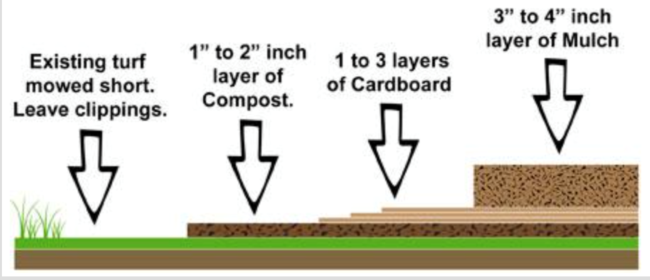
Living Mulch: Covercrops
What if you the mulch you use to cover your soil with is not made up of dead and decomposing things, but of living and thriving plants? Sure, they use up their own share of water, but what the offer in return makes up for that loss in many ways. First of all, the shade they provide for the ground, and the habitat the create for all kinds of organisms, outweighs that of the best sheet mulched bed. But then we haven’t even talked about their roots, which hold the soil together, along with the moisture trapped inside it, especially if they have fibrous root structures. Since plants also put a lot of effort into reaching water wherever it’s available, they will also pump it from deeper underground into the surface area, along with nutrients. Plants with long taproots are especially good at this. For this reason, it’s good to use mixed covercrops with fibrous roots and taproots.
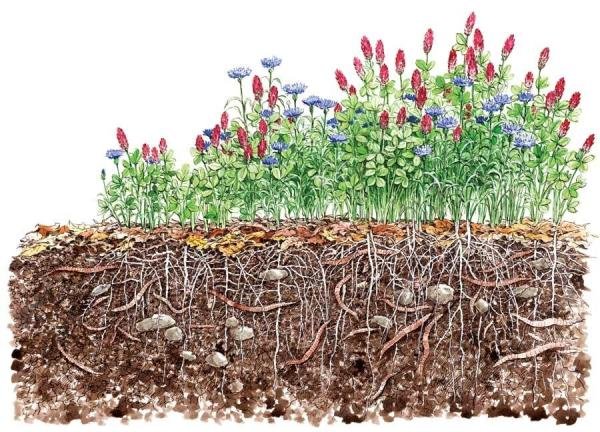
Just the Tip of the Iceberg
So many benefits to mulching! And originally all we wanted to do was to make the garden a bit more resistant to drought! But this is literally just the beginning. There are so many amazing new levels you can take to mulching, such as Hügelkultur. So it’s safe to say, once you discover the wonderful benefits of mulching, you’ll be likely to take it as far as you can.
Sources: 1, 2, 3, 4, 5, 6, 7, 8, 9
Note: I wrote this post and published it on this external site a few months ago. You can find more sustainability related posts in my series Permaculture in Theory and Practice.
Mulch is very important for garden health. People really do underestimate its value and what it does for the soil. I'm glad you've posted something like this. It is important to share this knowledge with others so they may know this as well. Thanks for sharing these interesting points!
Thank you for reminding me! Moving around in Permie circles my general impression that people have of mulch is something obvious (like duh). Of course I realize that this is far from the norm, so I appreciate your reminder.
With the economy the way it's going and how food prices are increasing, more and more people are getting into some type of gardening. It's good to share these ideas with others because a lot of people are scared to ask for help for fear of being shamed or called stupid. What's common knowledge for us takes others some time to learn. So your posts have a direct impact on the lives of those individuals and I thank you for posting important content like this.
Thank you, I really appreciate it.
This is a good way to make the soil moist and I would say that you had a good plan. Mulching encourages moisture content of the soil even if there is a prolonged drought. Plants can still survive till rain. However, most people think that this is the most difficult aspect of farming, especially when you want to practice leave mulching.
It certainly is not part of the "conventional" farming techniques. But if you look at nature, there is nothing that rakes up the leaves or collects the dead plant material. It all stays where it falls, and decomposes right there to become soil. We just can't rush the process.
Good evening @stortebeker, excellent gardening recommendations, I will see if I can apply some of this technique to my bushes even though I don't have a garden.
It was a pleasure to know your blog with those beautiful murals as colorful as everything Mexican. 🙂
Great to hear! I'm sure your bushes will appreciate the mulch. But how come you don't have a garden around those bushes? 😜 You know you could! But that's a topic for another Permaculture post.
To be honest, I haven't written these kinds of posts for a long time, event though that's what I started out it. But then I discovered other topics, including the murals. I'm happy that you liked them!
Mulching, oh now I know the right term to use.
I also learned about it from hive gardener here who posted that they don't remove weeds in their plants during summer or hot season so it could help retain the water in the ground. But they remove it when it is rainy season as weeds will grow fast together with their plants. I think it is also a way of mulching? Did I understood it right?
Putting those weeds being uprooted near in the plants could help retain moisture. Thanks for this information.
I would say, just leave the mulch even during the rainy season, because not only does it help the soil retain the water, but covering it will also discourage some weed (not all) from growing. More importantly, I would leave the mulch even during the rain, because gradually it decomposes into soil, and adds to its organic composition.
However, as always, it all depends on your region, your climate, and the types of plants in question, so it is always best to apply this general idea and modify it to the regional conditions, by observation and interaction.
I hope this helped. Please don't hesitate to ask, as I'm always happy to clarify. Thanks for stopping by! 😀
Oh yes, now I understand when my late father told us to put those leaves or weeds near the plant and now I know the reason. It helps retain the moisture and it will turn into fertilizer when it decomposed. Thank you so much for the clear answers. I learned a lot.
Of course, always my pleasure! 👍 😄 🤓 🙏
Very good explanations for mulching. I mulch with everything that I can find if there is too much open space I seed living mulch.
!BEER
Nice! Reminds me of the anecdote how Bill Mollison used old mattresses and other stuff in his garden for mulching. When confronted with the esthetic aspect, he just said something like "beautiful is what works".
:) indeed. I try to use stuff that can compost in place, but sometimes and plastic covers
!BEER
View or trade
BEER.Hey @stortebeker, here is a little bit of
BEERfrom @outlinez for you. Enjoy it!Learn how to earn FREE BEER each day by staking your
BEER.